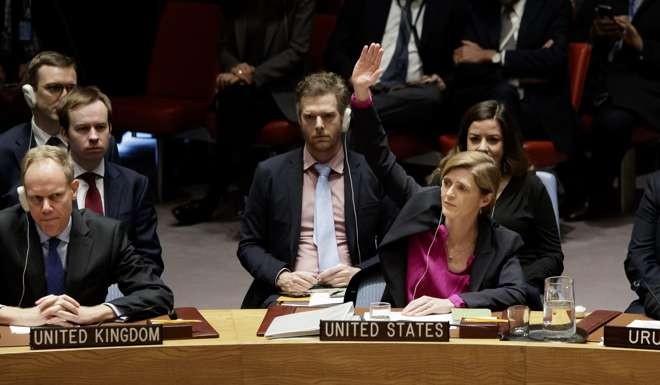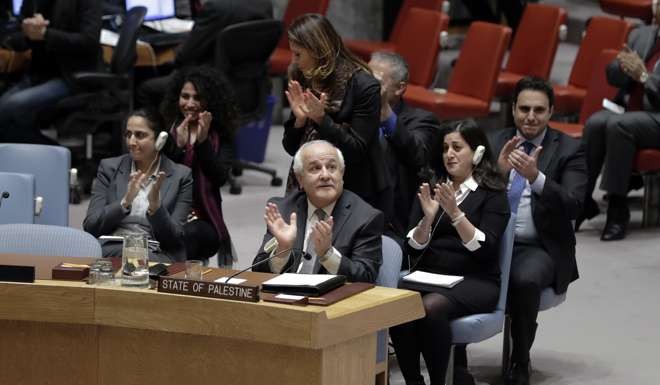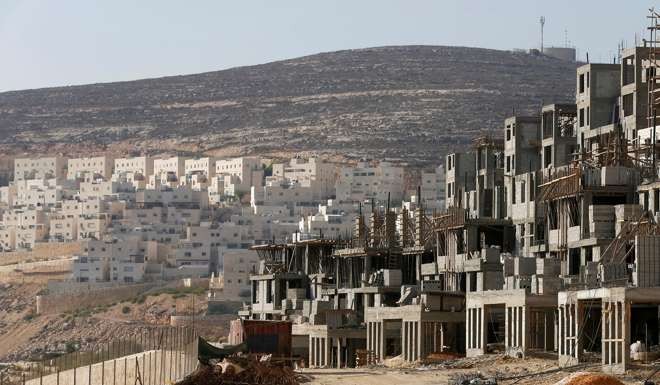
Israel condemns UN resolution on illegal settlements as ‘shameful’, recalls ambassadors from two nations than backed motion
UN Security Council condemns Israeli settlements
Israel issued an angry rebuke to a United Nations security resolution that condemned its settlement building in occupied territories, recalling two ambassadors to nations that co-sponsored the resolution.
On Friday, in a dramatic departure from longstanding US practice, Barack Obama’s government stepped aside and allowed the UN Security Council to censure Israeli settlement construction in the West Bank and east Jerusalem as a violation of international law.
Traditionally, it has used its veto power to quash such resolutions. But this time, with Israel’s conservative government railing against the Obama administration and president-elect Donald Trump demanding an American veto, the US abstained and the resolution was approved 14-0.
Israel recalled its ambassadors to New Zealand and Senegal, two of the four co-sponsors of the resolution. Tel-Aviv also cancelled a planned visit by the Senegalese foreign minister in January and announced it would cancel all aid to the African nation.
Israeli Prime Minister Benjamin Netanyahu labelled the move as “shameful” in a statement released immediately following the UN vote.
Responding to the Israeli moves, New Zealand’s foreign minister, Murray McCully, said the decision should have been no surprise to Israel, which knew Wellington’s position long before the UN vote.
“We have been very open about our view that the [security council] should be doing more to support the Middle East peace process and the position we adopted today is totally in line with our long-established policy on the Palestinian question.”
Although the resolution is largely in line with official US views on Jewish settlements, the move provoked an immediate firestorm. Some staunch congressional supporters of Israel suggested they would seek a halt to US financial support for the world body or impose punitive measures against countries that backed the resolution.
“I anticipate this vote will create a backlash in Congress against the United Nations,” Senator Lindsey Graham said in a statement denouncing the administration’s move as “flat-out reckless”.
Until now, successive US administrations have argued that negotiations, rather than Security Council resolutions, are the correct way to address Israeli-Palestinian disputes over issues including the settlements.

The episode marked a final burst of animosity between Netanyahu and the US administration in President Obama’s last few weeks in office.
The Israeli Prime Minister’s office called the resolution “shameful” and a “gang-up” against Israel.
“Israel looks forward to working with president-elect Trump and with all our friends in Congress, Republicans and Democrats alike, to negate the harmful effects of this absurd resolution,” the prime minister’s office said in a statement.
Palestinians were elated, though. Chief Palestinian negotiator Saeb Erekat, in a tweet by his office, described the resolution as “a victory for international law, a victory for civilised language and negotiation” and said it was a rejection of “extremist forces” in Israel.

Secretary of State John Kerry portrayed the US failure to quash the resolution as an American expression of support for a two-state solution that would “ensure Israel’s future as a Jewish and democratic state, living in peace and security with its neighbours.”
“That future is now in jeopardy,” Kerry insisted.
The resolution, whose passage was greeted by a burst of applause in the council chamber, states that settlements built on Palestinian lands occupied by Israel since the 1967 Mideast war have “no legal validity.” It describes a halt to settlement activity as essential for a climate that would allow for the creation of a Palestinian state.

A day of high-stakes diplomatic drama preceded the showdown vote. The council was to have taken up the resolution Thursday, but sponsor Egypt abruptly postponed action on the measure. It was then revived by four co-sponsors.
Before the vote, the Israeli government and the Obama administration had traded unaccustomedly sharp words, and Israel took the highly unusual step of turning to Trump for support, even though he has not yet taken office.
Trump – via Twitter, as is his practice – called on Obama to exercise the veto power the US holds as a permanent member of the Security Council.
The White House rebuffed Israeli accusations of colluding with the Palestinians and staging a “shameful” attack against Israel.
Liberal American Jewish organisations welcomed the American abstention. The group J Street said the measure “reaffirms the need for a two-state solution and calls for a halt to actions by both sides that serve to undermine the prospects for peace.”
But other groups that generally offer unconditional support for Israel’s actions expressed dismay. The head of the World Jewish Congress, Ronald Lauder, called the US decision to abstain “disconcerting and unfortunate”.
Israel and its backers were not mollified by language in the resolution that urged both sides to refrain from activities that could hurt peace prospects, including “acts of provocation, incitement and destruction.” That was meant as a rebuke to Palestinian leaders accused by Israel of condoning or encouraging attacks against Israelis, whether soldiers or civilians.

In protecting Israel in past Security Council votes, the US has defied world opinion, which runs strongly against the settlements. About 600,000 Israelis live in the West Bank and in east Jerusalem, which the Palestinians want as the capital of a future state.
Trump has already signalled that he intends to scrap core American policy on Israel and the Palestinians. For two decades, both Democratic and Republican administrations have adhered to the goal of a “two-state solution”, with Israel and a Palestinian state existing side by side.
The president-elect has pledged to move the US Embassy from Tel Aviv to Jerusalem, a step that would set the US at odds with Palestinians, and has picked a strident supporter of settlement activity, lawyer David Friedman, as the US ambassador to Israel.
Israel’s building in the West Bank and east Jerusalem has been a constant and particular bone of contention. While Obama has called settlements an obstacle to a two state-solution by making the creation of a Palestinian state more difficult, Netanyahu has vigorously rejected this argument.
From the beginning of his tenure in 2009, Obama pressured Netanyahu to freeze settlement activity, and administration officials have kept up a drumbeat of criticism following news of Israeli construction plans.
After the collapse of US-mediated talks in 2014, Obama largely pulled back from Israeli-Palestinian peacemaking. Politicians in Israel’s right-wing government and settler leaders have welcomed Trump’s accession enthusiastically, with some even declaring an end to the era of the two-state state solution.
